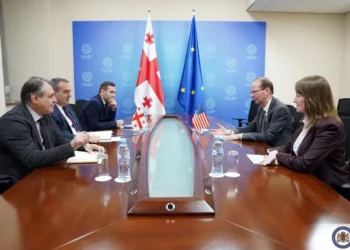Read Part 1.
In terms of the ongoing war in Ukraine, Europe is faced with a choice between the 1975 Helsinki Act and New Yalta. There is not much to choose from, although the complexity of the process was openly discussed at the Munich Security Conference in February 2022. And February 24 of the same year showed that the containment measures of the West, in particular of the United States, were not enough to prevent a reoccurrence of “Yalta” in Europe.
Along with pointing out the ineffectiveness of Western security policy with regard to the post-Soviet space, it is now openly discussed to what extent has the West’s stereotypical approach caused the vulnerability of Georgia, Ukraine, and Moldova. The question also has arisen, to what extent have Western partners delayed in finding effective alternatives to existing approaches to security and implementing them in a timely manner. Is it possible to restructure global relations in such a way that the phenomenon of spheres of influence becomes a thing of the past?
In our view, spheres of influence have been, are and will be a concomitant phenomenon of international politics for the foreseeable future. Some of the existing spheres will remain, some will be modified, and some may be completely replaced. One of the most important determinants of the end of the war in Ukraine will be the definition of spheres of influence, this time already in the area along the borders of the Russian Federation. In academic circles, there is more talk about this today; Politicians and government officials directly involved in the process are making much more cautious predictions.
It should also be noted that a sphere of influence is a place or location within which one major actor consolidates its advantage, both through geographic proximity and through an overt demonstration of power. The establishment of such an advantage is facilitated by the fear or reluctance of the other major actor or actors to accept the challenge and intervene. This reluctance is often motivated by the high risks or costs associated with interference.
Speaking about the fate of countries that found themselves in a peculiar geopolitical vacuum after the collapse of the USSR, we also think it necessary to point out some circumstances, which may be unpleasant to hear about, regarding the redistribution of spheres of influence. Thus, we will try to explain, at least partially, the geopolitical vacuum resulting from the lack of courageous action and certain stereotypes on the part of the West regarding the post-Soviet space. We can say that the result of the same stereotypes is the “comfort zone” in which the Western world voluntarily exists for several decades after the formal collapse of the USSR.
It is also telling that since the end of the Cold War, many statements by the United States and the collective West about the unacceptability of spheres of influence are examples of the pointless narcissism we have already discussed. Moreover, according to individual sources, what some today call Russia’s “backyard” (and hence sphere of influence), along with Russian expansionist policies, was also driven by Western tolerance (and, in some episodes, direct concessions). It should also be noted that after the collapse of the Soviet Union, one of the Western narratives was to recognize the Russian Federation as the sole legal successor to the Soviet Union. This would not have been a problem were it not for the fact that this same recognition was accompanied by a so-called element of “conditional sovereignty” of neighboring countries, which, again, implied Russia’s dominant role over these countries.
It is a fact that, given the realities of the current stage, only statements or half-measures – to maintain in one form or another the comfort zone mentioned – will not fit the time and the current processes. Thus, a result-oriented, practical policy that fits current requirements and reality is inevitable. Any other approach would be like repeating well-known “what if” reasons from the past.
One more thing: the structuring of the modern security system does not a priori require a special formal declaration by one major actor of its influence in one or another sphere and a formal renunciation of influence by another actor. For example, one political consequence of the war in Ukraine may be that the country remains outside the U.S. declared sphere of influence, which does not preclude the continuity of assistance in military and security capacity building. This approach of delegating primary responsibility for one’s own defense will serve as an equally effective counterweight to weakening or even nullifying the sphere of influence of an unfriendly country. As a variety of so-called experimental systems of security, this option is also worth evaluating in order to raise the bar for our country’s national security.
And since we are talking about defining or revising spheres of influence, including in terms of a possible renewal of geopolitical boundaries in Eastern Europe, it is equally relevant to ask what might lead to the decision to change/revise the status quo. Especially when we agree that the best way to achieve real results in today’s environment is not through useless ideological clichés, but by finding a pragmatic intersection of interests. In this regard, one of the key factors will be the correct identification of existing or potential threats, as well as the possession of auxiliary means of their management (balancing). We would like to say a few words on this as well.
Balancing the threat
Undoubtedly, alliances as well as other kinds of ally and partnership relationships are in many ways a response to existing and future threats. It is also clear that the threat to a small country can come mainly from an aggressive neighbor. Therefore, the desire of a small country to find a support, a partner, a reliable guarantor of its national security is understandable. It should also be noted that balancing (and in some cases roughly eradicating) a threat – real or imagined – is not only the concern of a small country.
This task applies equally to a large country – especially when an event or process may be seen by it as contrary to its own security interests. A frequently cited example to illustrate this is the well-known wave of NATO expansion in Eastern Europe, which the Russian Federation saw as an alleged violation of an agreement reached with the West (even today mutually exclusive assessments around such an “agreement” do not cease) and as an act of encroachment on the Russian sphere of influence (it should be noted that although a minority, some Western scholars consider this assessment not unreasonable).
In the context of the war in Ukraine, the decision by Sweden and Finland to change the status quo and apply for membership in the North Atlantic Alliance, which amounts to a reassessment of the emerging threats and an attempt to balance them, is also telling. Linked to the same geopolitical and military opinion is Israel’s line of regional policy in the Middle East, based on the Abrahamic Accord, as well as several situational-tactical alliances in the Indian and Pacific Ocean basins (AUKUS, Quad). These and other examples of threat assessment and management measures in specific geographic regions serve to unify the following objectives: balancing threats based on the nature of spheres of influence, managing the security environment, and preventing further military escalation.
The collective Western involvement in the Russia-Ukraine war, in the form and scale that we see today, is widely believed to fall into the same category. In particular, according to a certain Western political-academic line, Western support for Kiev serves to counterbalance future threats that might emerge as a result of an undesirable war scenario in Ukraine or the spillover of hostilities outside of Ukraine (and hence the expansion of Russia’s sphere of influence). The cost of mitigating and containing additional threats, both direct and indirect, arising in the event of such a development would be much higher. Thus, existing threats vs. future threats and current costs vs. future costs already require rational optimization and management by introducing appropriate forms.
We think that Official Tbilisi should take all of this into consideration in order to communicate with its partners on national security issues in a meaningful and timely manner.
To be continued.
Analysis by Victor Kipiani, Geocase Chairman














